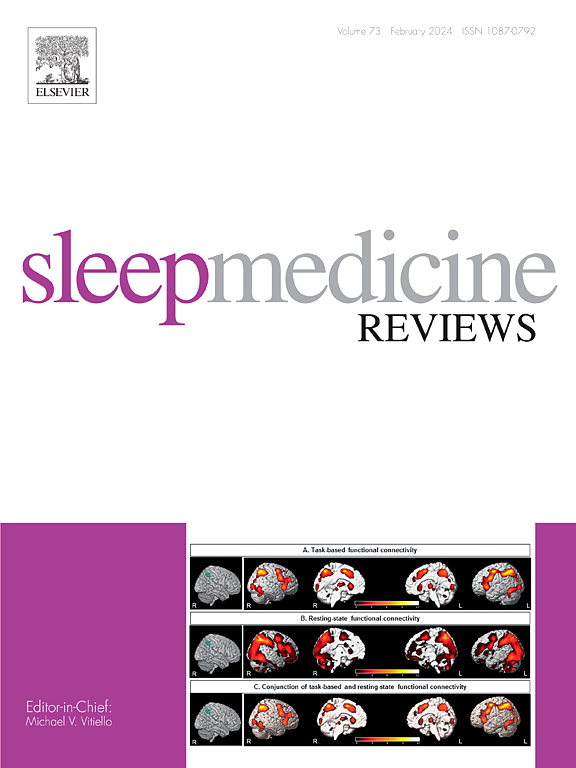The effect of alcohol on subsequent sleep in healthy adults: A systematic review and meta-analysis
IF 11.2
1区 医学
Q1 CLINICAL NEUROLOGY
引用次数: 0
Abstract
Alcohol is commonly consumed prior to bedtime with the belief that it facilitates sleep. This systematic review and meta-analysis investigated the impact of alcohol on the characteristics of night-time sleep, with the intent to identify the influence of the dose and timing of alcohol intake. A systematic search of the literature identified 27 studies for inclusion in the analysis. Changes in sleep architecture were observed, including a delay in the onset of rapid eye movement (REM) sleep and a reduction in the duration of REM sleep. A dose-response relationship was identified such that disruptions to REM sleep occurred following consumption of a low dose of alcohol (≤0.50 g∙kg−1 or approximately two standard drinks) and progressively worsened with increasing doses of alcohol. Reductions in sleep onset latency and latency to deep sleep (i.e., non-rapid eye movement stage three (N3)) were only observed following the consumption of a high dose of alcohol (≥0.85∙g kg−1 or approximately five standard drinks). The effect of alcohol on the remaining characteristics of sleep could not be determined, with large uncertainty observed in the effect on total sleep time, sleep efficiency, and wake after sleep onset. The results of the present study suggest that a low dose of alcohol will negatively impact (i.e., reduce) REM sleep. It appears that high doses of alcohol may shorten sleep onset latency, however this likely exacerbates subsequent REM sleep disruption. Future work on personal and environmental factors that affect alcohol metabolism, and any differential effects of alcohol due to sex is encouraged.
酒精对健康成人后续睡眠的影响:一项系统回顾和荟萃分析
喝酒通常是在睡觉前喝,因为人们相信喝酒有助于睡眠。本系统综述和荟萃分析调查了酒精对夜间睡眠特征的影响,目的是确定饮酒剂量和饮酒时间的影响。对文献的系统检索确定了27项研究纳入分析。观察到睡眠结构的变化,包括快速眼动(REM)睡眠的开始延迟和快速眼动睡眠的持续时间缩短。确定了一种剂量-反应关系,即在饮用低剂量酒精(≤0.50 g∙kg-1或大约两种标准饮料)后会出现快速眼动睡眠中断,并随着酒精剂量的增加而逐渐恶化。睡眠开始潜伏期和深度睡眠潜伏期(即非快速眼动第三阶段(N3))的减少仅在饮用高剂量酒精(≥0.85∙g kg-1或约5标准饮料)后观察到。酒精对睡眠其他特征的影响尚不能确定,对总睡眠时间、睡眠效率和睡眠后觉醒的影响存在很大的不确定性。目前的研究结果表明,低剂量的酒精会对快速眼动睡眠产生负面影响(即减少)。高剂量的酒精可能会缩短睡眠潜伏期,但这可能会加剧随后的快速眼动睡眠中断。鼓励对影响酒精代谢的个人和环境因素的进一步研究,以及性别对酒精的任何不同影响。
本文章由计算机程序翻译,如有差异,请以英文原文为准。
求助全文
约1分钟内获得全文
求助全文
来源期刊

Sleep Medicine Reviews
医学-临床神经学
CiteScore
20.10
自引率
3.80%
发文量
107
期刊介绍:
Sleep Medicine Reviews offers global coverage of sleep disorders, exploring their origins, diagnosis, treatment, and implications for related conditions at both individual and public health levels.
Articles comprehensively review clinical information from peer-reviewed journals across various disciplines in sleep medicine, encompassing pulmonology, psychiatry, psychology, physiology, otolaryngology, pediatrics, geriatrics, cardiology, dentistry, nursing, neurology, and general medicine.
The journal features narrative reviews, systematic reviews, and editorials addressing areas of controversy, debate, and future research within the field.
 求助内容:
求助内容: 应助结果提醒方式:
应助结果提醒方式:


